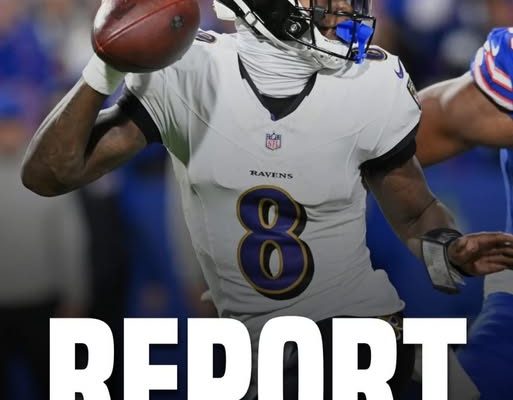The Baltimore Ravens’ recent nail-biter against the Buffalo Bills left fans on the edge of their seats, and now star quarterback Lamar Jackson is opening up about what really happened in the waning moments of the game. Jackson revealed that late in the fourth quarter, he was battling cramps, and that limited his ability to fully push head coach John Harbaugh to go for it on a critical 4th-and-three situation at midfield. This admission provides a rare glimpse into the physical challenges players face in high-pressure moments and adds an extra layer of intrigue to the game’s dramatic ending.
Throughout the contest, the Ravens and Bills traded blows in a game that tested both teams’ resilience and strategy. Baltimore’s offense had moments of brilliance, with Jackson orchestrating key drives and showcasing his mobility and playmaking ability. However, the game came down to the final possessions, where decisions made by coaches and players carry an outsized weight. Jackson’s cramps, a reminder that even elite athletes are human, meant he couldn’t advocate as aggressively for the high-risk, high-reward call that might have altered the outcome of the game.
Ultimately, the Ravens opted to punt on 4th-and-three, a decision that sparked immediate debate among fans and analysts alike. Some argued that with Jackson’s skill set and ability to extend plays, Baltimore should have taken the gamble and tried to convert, keeping the ball in their hands and potentially controlling the game’s destiny. Others pointed out that punting was the safer choice given the field position and the physical state of the quarterback. The nuance in this decision highlights how football is not just about raw talent, but also about situational awareness, risk management, and human limitations.
The decision to punt proved consequential as Bills quarterback Josh Allen methodically drove his team down the field to secure the win. Allen’s composure under pressure and ability to execute a clutch drive further underscored the razor-thin margins that separate victory from defeat in the NFL. Ravens fans, understandably, were left questioning “what if?” scenarios: What if Jackson had been at full strength? What if the team had gone for it on 4th down? Could the outcome have been different? These questions are not just hypothetical—they’re the lifeblood of passionate sports debate, and they fuel discussions across social media, podcasts, and locker rooms alike.
Jackson’s candidness about his physical state opens up another layer for fans to explore. It’s easy to focus purely on the scoreboard or coaching decisions, but hearing from a player about the actual physical constraints they face during the game adds depth to the conversation. It reminds everyone that football is a game played with split-second decisions, intense physical strain, and the mental fortitude to perform under pressure. Jackson’s willingness to share this detail invites fans to consider the human element behind the stats and highlights.
This moment also adds to the ongoing discussion about Jackson’s leadership and approach to advocating for his team on the field. Even when limited by cramps, he was thinking strategically about the potential impact of going for it on 4th-and-three. That kind of game awareness, combined with his elite skill set, is why he remains one of the most dynamic quarterbacks in the league. Fans can debate whether more aggressive play-calling should be standard when he’s on the field or whether prudence is the hallmark of good coaching.
The Ravens’ fanbase is known for its passionate engagement, and this scenario provides the perfect spark for conversation. From analyzing coaching decisions to evaluating Jackson’s physical readiness, the topics are endless. Some may argue that Harbaugh should have trusted his quarterback’s instincts more, while others will defend the decision to play it safe. Engaging in these discussions helps fans feel closer to the game, sharpening their understanding of the strategic intricacies that define professional football.
Furthermore, this game serves as a case study for the unpredictable nature of sports. Injuries, fatigue, and physical limitations can all shift the balance of a contest, making each game a unique story of resilience and adaptation. Jackson’s honesty about cramping is a reminder that no matter how talented a player is, factors outside their control—like muscle fatigue—can impact the outcome. It’s a lesson in empathy for fans and a call to appreciate the complexity of the game beyond simple wins and losses.
The broader implications of this game and Jackson’s admission also extend into debates about quarterback autonomy and team dynamics. How much influence should a quarterback have in late-game decision-making? Should coaches defer more to their player’s instincts, especially someone with Jackson’s experience and ability? These are questions that spark rich discussion and allow fans to engage with football not just as spectators, but as analysts and strategists.
For those watching the Ravens this season, the game against the Bills will likely remain a talking point for some time. It highlights the delicate balance between caution and aggression, the physical toll on athletes, and the razor-thin margins that define success at the highest level of competition. Jackson’s transparency invites fans into the locker room, giving them insight into the real challenges faced by players, and encouraging lively debate about what might have been.
Whether fans agree with the decision to punt or feel the Ravens should have taken the risk, this scenario provides an ideal platform for conversation. Sharing opinions, dissecting plays, and debating what could have happened keeps the fan community vibrant and engaged. Sports are about more than just statistics; they’re about storytelling, personal experience, and connecting with others over shared passion. Lamar Jackson’s revelation gives fans the perfect starting point for that dialogue.
What do you think—should the Ravens have gone for it on 4th-and-three, or was punting the smarter choice given the circumstances? Did Jackson’s cramps truly change the outcome, or would the game have unfolded the same way regardless? Engage with other fans, share your take, and discuss the nuances of this moment, because conversations like these are what make following the NFL so electrifying. This game wasn’t just another matchup; it was a story of human limits, strategic decision-making, and the thrill of professional football at its finest. Fans have every reason to debate, analyze, and weigh in on every angle of this game, because moments like this are the heart of sports fandom.
Lamar Jackson’s candid admission invites not only empathy for his physical struggle but also a deep dive into the strategic chess match that defines NFL contests. It sparks a conversation about risk, leadership, and the human element of sport that statistics alone cannot capture. For Baltimore fans, and NFL enthusiasts everywhere, this is a moment to discuss, analyze, and most importantly, engage with the game on a level that goes beyond the final score. Every choice, every decision, every physical limitation has a story—and this story is just one chapter in the ongoing saga of Lamar Jackson and the Ravens. So weigh in, voice your opinion, and join the debate. How do you think the Ravens should approach similar situations in the future? Would you have trusted Jackson to push for it despite the cramps, or was punting the prudent call? The discussion is wide open, and your perspective is part of what makes it so compelling.
This game serves as a reminder of why football is such a passionate sport: it’s unpredictable, intensely human, and endlessly debatable. Moments like Jackson’s cramps and the resulting strategic decisions illustrate the intersection of physical endurance, tactical intelligence, and split-second judgment. Fans who engage in these conversations not only enrich their own understanding but also contribute to a broader appreciation of the game. Every fan comment, debate point, and analysis deepens the connection to the sport and keeps the excitement alive long after the final whistle. So, dive into the discussion, share your thoughts on Jackson’s admission and the Ravens’ decision-making, and keep the conversation going, because this is exactly the kind of scenario that makes NFL fandom so vibrant and enduring.
Lamar Jackson’s honesty may have left the Ravens short-handed in the moment, but it opens the door for fans to explore the intricacies of football like never before. The game against the Bills will be remembered not only for its thrilling conclusion but also for the layers of strategy, human endurance, and decision-making it revealed. This is your chance to engage, analyze, and debate—because in the world of sports, every perspective adds to the richness of the story. Don’t hold back—let your voice be heard on what could have been and what the Ravens might do differently next time. Your insight is part of the conversation, and moments like this are why fans keep coming back week after week, eager to dissect, debate, and share their love for the game.



